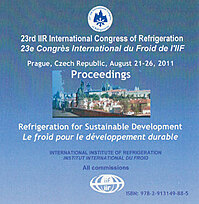
Document IIF
Nouvelle approche de modélisation fondée sur la prévision de la qualité d'écoulement d'un écoulement diphasique de frigorigène pendant l'évaporation et la condensation.
Novel modeling approach based on flow quality prediction of a two-phase flow of refrigerant during evaporation and condensation.
Numéro : pap. ID: 177
Auteurs : FAYSSAL I., MOUKALLED F.
Résumé
This paper presents a new modeling approach based on flow quality prediction of a two phase flow of refrigerant during evaporation and condensation. The current work considers the variation of thermodynamic and transport properties during the evolution of change of state process. The model will be implemented to predict the evaporator/condenser pressure drop and its impact on the heat exchanger size. A proposed equation for flow quality prediction is established accounting for pressure drop effects. Another flow quality prediction model is derived from the mass conservation equations using the mean velocity of liquid and vapour phases. Both methods showed a very high compatibility predicting up to 96% of the change of state processes. The proposed model for flow quality prediction has a limitation in predicting the last 4% of the evaporation process and this was justified as a mathematical restriction for flow quality higher than 96%.
Documents disponibles
Format PDF
Pages : 8 p.
Disponible
Prix public
20 €
Prix membre*
Gratuit
* meilleur tarif applicable selon le type d'adhésion (voir le détail des avantages des adhésions individuelles et collectives)
Détails
- Titre original : Novel modeling approach based on flow quality prediction of a two-phase flow of refrigerant during evaporation and condensation.
- Identifiant de la fiche : 30001605
- Langues : Anglais
- Source : Proceedings of the 23rd IIR International Congress of Refrigeration: Prague, Czech Republic, August 21-26, 2011. Overarching theme: Refrigeration for Sustainable Development.
- Date d'édition : 21/08/2011
Liens
Voir d'autres communications du même compte rendu (569)
Voir le compte rendu de la conférence
Indexation
-
Thèmes :
Frigorigènes, frigoporteurs : généralités;
Thermodynamique et changement d’état;
Transfert de chaleur;
Systèmes de détente;
Transfert de masse;
Ecoulement diphasique - Mots-clés : Écoulement diphasique; Propriété thermodynamique; Modélisation; Évaporation; Frigorigène; Condensation; Chute de pression
-
LOCAL FRICTIONAL PRESSURE DROP DURING VAPORIZAT...
- Auteurs : LIN S.
- Date : 1991
- Langues : Anglais
- Source : Int. J. multiph. Flow - vol. 17 - n. 1
Voir la fiche
-
Flow boiling of ammonia and hydrocarbons: a sta...
- Auteurs : THOME J. R., CHENG L., RIBATSKI G., et al.
- Date : 06/2008
- Langues : Anglais
- Source : International Journal of Refrigeration - Revue Internationale du Froid - vol. 31 - n. 4
- Formats : PDF
Voir la fiche
-
Pressure drop of HFE7000 and HFE7100 during flo...
- Auteurs : MIKIELEWICZ D., WAJS J., ANDRZEJCZYK R., et al.
- Date : 08/2016
- Langues : Anglais
- Source : International Journal of Refrigeration - Revue Internationale du Froid - vol. 68
- Formats : PDF
Voir la fiche
-
Experimental study on heat transfer and pressur...
- Auteurs : KOYAMA S., BABA D., NAKAHATA H.
- Date : 21/08/2011
- Langues : Anglais
- Source : Proceedings of the 23rd IIR International Congress of Refrigeration: Prague, Czech Republic, August 21-26, 2011. Overarching theme: Refrigeration for Sustainable Development.
- Formats : PDF
Voir la fiche
-
Two-phase flow heat transfer and pressure drop ...
- Auteurs : WIJAYA H., SPATZ M. W.
- Date : 01/1995
- Langues : Anglais
- Source : ASHRAE Transactions.
Voir la fiche
